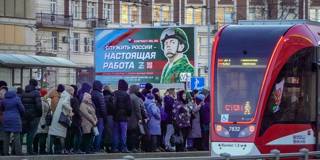Today, the Kremlin is working tirelessly to give the impression that Russia is a beacon of stability and strength, and that a grateful people is fervently devoted to their leader, Vladimir Putin. But behind the façade lie despair, paranoia, intolerance, rage, and proliferating violence.
MOSCOW – In the late eighteenth century, Catherine the Great planned a tour of Crimea, which her court favorite, Count Grigory Potemkin, had conquered a few years earlier. But while Potemkin had managed to seize the agriculturally rich peninsula from the Ottoman Empire, he had failed to achieve the promised colonization.
To save face, Potemkin ordered the construction of a row of painted pasteboard façades beside the river along which the empress would travel, and brought in cheerful villagers and herds of healthy livestock to complete the illusion. There was no prosperity, but it sure looked like there was.
Versions of “Potemkin villages” have been a staple of Russian history ever since. During Soviet times, the image that communism improved life for all obscured systemic violence and repression. And today, the Kremlin works tirelessly to create the impression that Russia is a beacon of stability and strength, and that a grateful people is fervently devoted to their leader, Vladimir Putin; but behind the façade, one finds disillusion, despair, fear, and rage.

MOSCOW – In the late eighteenth century, Catherine the Great planned a tour of Crimea, which her court favorite, Count Grigory Potemkin, had conquered a few years earlier. But while Potemkin had managed to seize the agriculturally rich peninsula from the Ottoman Empire, he had failed to achieve the promised colonization.
To save face, Potemkin ordered the construction of a row of painted pasteboard façades beside the river along which the empress would travel, and brought in cheerful villagers and herds of healthy livestock to complete the illusion. There was no prosperity, but it sure looked like there was.
Versions of “Potemkin villages” have been a staple of Russian history ever since. During Soviet times, the image that communism improved life for all obscured systemic violence and repression. And today, the Kremlin works tirelessly to create the impression that Russia is a beacon of stability and strength, and that a grateful people is fervently devoted to their leader, Vladimir Putin; but behind the façade, one finds disillusion, despair, fear, and rage.